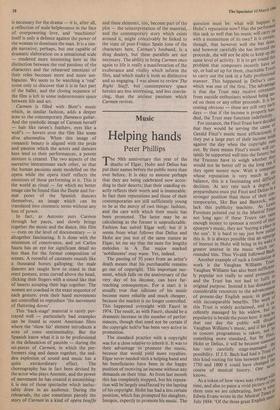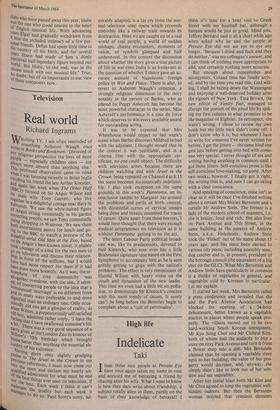Music
Helping hands
Peter Phillips
The 50th anniversary this year of the deaths of Elgar, Hoist and Delius has put their names before the public more than ever before. It is easy to assume perhaps that they are being celebrated now accor- ding to their deserts; that their standing ex- actly reflects their worth and is immutable. In fact their reputations and those of their contemporaries are still sufficiently young to be at the mercy of two things: fashion, and the care with which their music has been promoted. The latter may be as calculating as the former is unpredictable. Fashion has suited Elgar well; but if it seems from what follows that Delius and Hoist are just not of the same stature as Elgar, let me say that the taste for lengthy melodies in A flat major marked "nobilmente' may wane. Yes, indeed.
The passing of 50 years from an artist's death means that his purchasable remains go out of copyright. This important mo- ment, which falls on the anniversary of the very day of his decease, can have far- reaching consequences. For a start it is usually true that editions of his music become more reliable and much cheaper, because the market is no longer controlled. This happened overnight with Faure in 1974. The result, as with Faure, should be a dramatic increase in the number of perfor- mances, though that need not be certain if the copyright holder has been very active in promotion.
The standard practice with a copyright was for a close relative to inherit it. It was to their advantage to promote the music, because that would yield more royalties. Elgar never needed such a helping hand and his beneficiaries have been in the happy position of receiving an income without any demands on their time. As from last month this has completely stopped, but his reputa- tion will be largely unaffected by the lapsing of his copyright. Hoist has had a less certain position, which has prompted his daughter, Imogen, expertly to promote his music. The
The Spectator 10 March 1984 question must be: what will happen to Hoist's reputation now?. Has she perforated this task so well that his music will carry on with a momentum of its own? It is certain, though, that however well she has done, and however carefully she has invested the proceeds, she will not be able to keep up the same level of activity. It is to get round this problem that composers recently have set up, or had set up for them, charitable Trusts to carry out the task in a fully professional manner. This happened in Delius's case, which was one of the first. The advantage is that the Trust may receive covenants from outside enthusiasts without being tax. ed on them or any other proceeds. It is be- coming obvious — these are still very ear," days — that if the income is properly han- dled, the Trust may function indefinitelY', For instance, the Finzi Trust have decide°, that they would be serving the cause 0i Gerald Finzi's music most efficaciously d, they put a large part of their income asi! against the day when the copyright irtl°' out. By these means Finzi's music will eel.- tainly be supported well into the future; but the Trustees have to weigh whether thq would not be better off in the long run I.,. they spent money now. With a composh-e whose reputation, is very much in tit balance, this is a fascinating and diffic154 decision. At any rate such a degree 'a preparedness must put Finzi and Delius in stronger position than those of their con- temporaries, like Bax and Bantock, lack this publicity machine. As l-t-es Foreman pointed out in the Music(/' T'll:,e not long ago: if these Trusts can tal',r enough money to sponsor a record of 04.1i, eponym's music, they are 'buying a Placetiori. the sun'. It is hard to say just how tim ne this is. It is always possible that an upsurge of interest in Hoist will bring in its wake!. greater interest in the music which rounded him. Thus Vivaldi followed each Another example of such a foundationE. work is the Vaughan Williams Trust, Vaughan Williams has also been sufficif,110 ly popular not really to need proillotwls and the Trust has not had to fulfil, :ts original purpose. Instead it has donate '„t considerable resources to the advancenteal", of present-day English music in genher of with incomparable benefits. The wort` eic., this Trust is widely acclaimed, and is its cellently managed by his widow, but,, be popularity is beside the point here- It tri.a'aecl that one day the public will discwe Vaughan Williams's music, and if his P'bv in concert programmes is taken, not v, ,„ something more standard, but by v;,/le Hoist or Delius, it will be because sorrle-oe has very carefully stage-managed of possibility. If J.S. Bach had had a Trust yea this kind rooting for him between the ;lets 1750 and 1800 it could have change' ver course of musical history. One Pe knows. „. with As a token of how views may change ate time, andalso tor paint a vivid pi ctur ew ,i threemenweareeetehrattnghereis:t Edwin Evans wrote in the Musical TO:usie July
1934: 'Of the three great English in
clans who have passed away this year, Hoist was the one Who stood nearest to the heart of English Musical life. With advancing Years Elgar had gradually withdrawn from it into the secluded intimacy of a few per- sonal friends. Delius had spent little time in the Country of his birth, and for several Years illness had made of him a dimly perceived half-legendary figure beyond our world. But Hoist, to the end, was in the closest touch with our musical life.' True, no doubt, but of no importance to our view of these composers now.







































 Previous page
Previous page